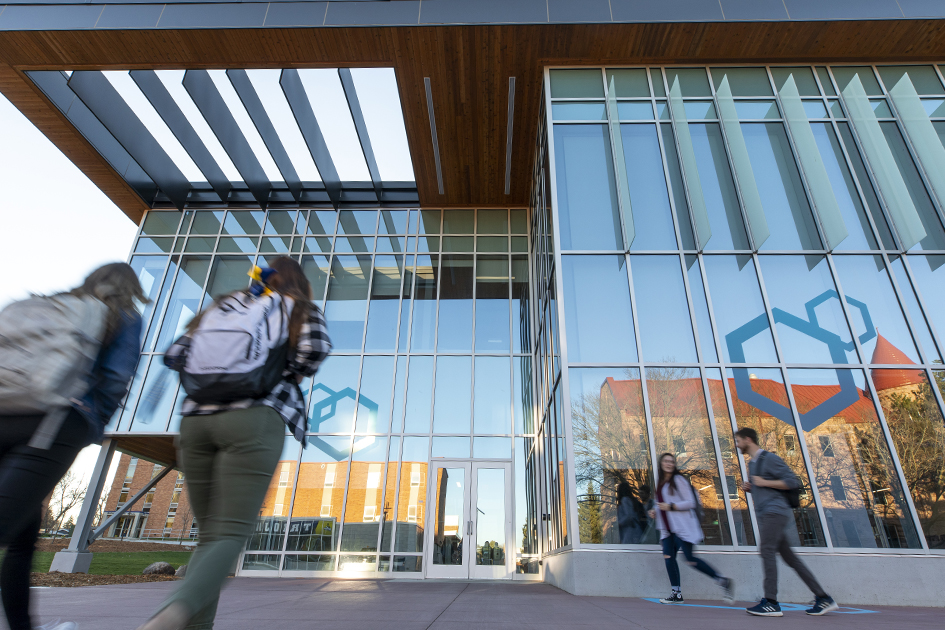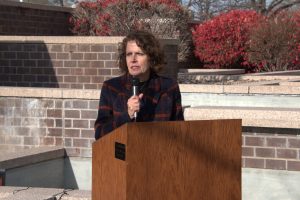MADISON, S.D. – Students, faculty and alumni of Dakota State University (DSU) plan to line the streets to peacefully protest Secretary of Homeland Security Kristi Noem (formerly South Dakota Governor) as the spring commencement speaker and the recipient of an honorary doctorate from DSU.
Graduation is set for the Dakota Prairie Playhouse on May 10 at 10:30 a.m., preceded by a hooding ceremony for graduate students at 8:30 a.m. Both the hooding and commencement will be livestreamed and available for people who cannot attend in person.
Over 1,000 people have signed a petition to rescind Kristi Noem’s honorary degree nomination and commencement speaker invitation from DSU.
A local advocacy group, Madison Area Stands Together (MAST) in announcing plans for a protest, called Noem’s appearance “an affront” due to her role in President Donald Trump’s immigration policies and the effect this has had on immigrants and international students.
On a group Facebook post, Susan Keey Wicks wrote, “Our small local organization, Madison Area Stands Together (MAST), in coordination with a group of DSU students who are planning their own events, plans to have a peaceful rally and sustained presence on the streets of Madison the morning of commencement. We encourage those in opposition to Noem’s actions to be aware and prepared.”
On March 19, 2025, the DSU Student Senate voted against a commencement address invitation and awarding Noem an honorary degree. The university’s general faculty also voted against Noem presenting the commencement address or an honorary degree, according to Anden Wieseler, Vice President of the Student Senate.
The resolution rejecting Noem as DSU commencement speaker or honorary graduate refers to Noem’s statements on “immigrants, transgender people, those of opposing political viewpoints, and other classes of individuals,” which the students described in the letter as “widely perceived as negative, in some cases false, and is therefore a detriment to the goals and mission of Dakota State University.”
Noem’s rhetoric regarding immigrants, transgender people, political opponents and others are cited in the resolution against Noem and university administration. The Student Senate’s resolution said the honorary degree is “ill-timed, ill-advised, and a violation of Dakota State University Policy.”
After the resolution had passed however, the general faculty reconvened for a second vote on Noem’s commencement address and nomination to receive an honorary doctorate from DSU, which passed.
A group of DSU alumni have expressed their support for the Student Senate and its rejection of Noem. Elliott O’Donnell, Brandi Lueninghoener, Jordan Stewart, Nathan Harmer and Nathan Ord, wrote a letter expressing “our strong support” of the Student Association Senate, saying Noem’s recognition brings out “serious ethical and moral concerns.”
“When the university chooses to elevate a figure like Secretary Noem—whose record includes policies and public statements that many view as directly harmful to marginalized communities—it sends a signal that runs counter to the values of inclusivity, integrity, and academic responsibility that should guide higher education,” the statement read.
The university has not indicated plans to withdraw Noem’s invitation, instead stressing her support of DSU as an institution.
DSU Chief Marketing Officer Andrew Sogn told the Madison Daily Leader, “During her time as governor, Noem was an unwavering champion of Dakota State programs and initiatives. She was able to see that cybersecurity had the potential to be the next big industry in South Dakota and could bring an economic benefit to the state through its workforce development potential. With her support, DSU was able to develop, amplify, and implement our ideas about cybersecurity education, research, and workforce development into a $100 million cyber-research initiative, including $30 million from the state for program expansion. She was also a champion in our efforts to establish a Center of Quantum Information Science & Technology in partnership with South Dakota School of Mines.
As Homeland Security secretary, Noem oversees Immigration and Customs Enforcement (ICE), which has been at the center of numerous federal controversies regarding deportations.
Multiple universities, including in South Dakota, have reported that international students had their visas revoked, including over minor traffic offenses, multiple media outlets have reported. At least one of those revocations has been challenged in federal court with the judge in that case issuing a stay.
An overall cloud of fear and apprehension is being reported across campuses in the U.S. (including South Dakota) where foreign exchange students are afraid of being arbitrarily taken by Noem’s U.S. Immigration and Customs Enforcement Agency (ICE) personnel, detained and deported to unknown destinations.
DSU currently has 200 international students who come from over 52 different countries. No DSU international students have informed the university that their visas were revoked, Sogn told the Daily Leader on April 28.
One Madison resident and DSU alum said he’s appalled at the decision to allow Noem to speak at the graduation.
“Students who come here to Dakota State whether they’re immigrants or not should know that their hard work and their efforts towards education are going to be honored and respected and made secure,” Charlie Johnson said.
“The DSU Student Association Senate understands the gravity of the actions of our administrators, both locally and federally,” Wieseler said. “Know that I and my fellow senators will not stop fighting to make sure there is transparency and accountability to students, including being situationally aware of what’s happening on campus, speaking out on behalf of student interests and concerns to University administrators, and promoting the right of the students to advocate for each other.”
Meanwhile, after weeks of confusion and legal battles, the Department of Justice said on April 25 it has restored, or plans to restore, the records of hundreds of students in the Student and Exchange Visitor Information System, or SEVIS. Without those records, students couldn’t stay in the U.S., even if they were about to graduate or still in good standing with their schools.





